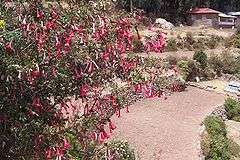Cantua buxifolia
| Cantua buxifolia | |
|---|---|
 | |
| Cantutas in the garden of Qurikancha (today's Convento Santo Domingo) | |
| Scientific classification | |
| Kingdom: | Plantae |
| (unranked): | Angiosperms |
| (unranked): | Eudicots |
| (unranked): | Asterids |
| Order: | Ericales |
| Family: | Polemoniaceae |
| Genus: | Cantua |
| Species: | C. buxifolia |
| Binomial name | |
| Cantua buxifolia Lam. | |

Cantua buxifolia, (/ˈkæntuːə bʌksᵻˈfoʊliə/, hispanicized spellings Cantuta, Ccantu), known as Qantu, Qantus or Qantuta (Quechua,[1]) is a flowering plant found in the high valleys of the yungas. It is the national flower of Peru and one of two national flowers of Bolivia, the other being the patujú. The Bolivian national flower is in fact a particular variety of qantuta, the "qantuta tricolor" which has red petals, a yellow floral tube and a green calyx, reflecting the colors of the national flag.
Inca Legend
The Inca legend associated with the cantua is the tale of two kings named Illimani and Illampu and their sons. Both kings were powerful and wealthy rulers of a vast country in the Qullasuyu region (today's Bolivian Altiplano), and each had a beloved son whom the people held in great esteem. But as time passed, the kings became irritated at each other's prosperity, and eventually one of them attacked the other.
During the battle, the two kings mortally wounded each other, and were carried away. Each on his dying bed called his son and had him vow to avenge him, even if each son had been opposed to the war in the first place. Bound by their pledge, the sons prepared and led a second war even though they held no grudge against each other. History repeated, and each son inflicted a fatal wound on the other.
But instead of harsh words, the dying sons generously forgave each other, and asked that their servants place them side by side on the green grass of the battlefield. Then appeared Pachamama, goddess of fertility, who told the young kings before they died that they shouldn't have suffered from their fathers' unjustified enmity. To punish their dead fathers, their stars fell from the sky and became the snow-covered mountains still named Illimani and Illampu which are some of the highest peaks in Bolivia.
The rivers of their slowly melting snow are their tears of regret and fertilize the valleys. The cantua bloom symbolizes the people's unity, and bears the colours of the two kings' sons (red and yellow), as well as green (standing for hope).
Common names
Common names include Flor del Inca (Spanish for "flower of the Inca"), Magic-flower, Magic-flower-of-the-Incas, Magictree, Sacred-flower-of-the-Incas.
References
- ↑ Teofilo Laime Ajacopa, Diccionario Bilingüe Iskay simipi yuyayk'ancha, La Paz, 2007 (Quechua-Spanish dictionary)
- the complete legend of the tricolor Kantuta, translated in French from Leyendas de mi tierra by Antonio Díaz Villamil (Editorial América srl, La Paz).
- Germplasm Resources Information Network (GRIN): Cantua buxifolia
- National flowers of Bolivia